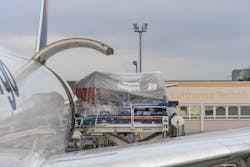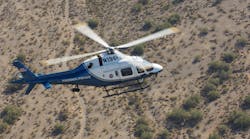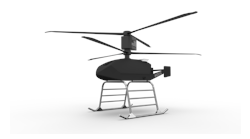Together with Lufthansa Cargo, Lufthansa Technik AG has reached another important milestone in its preparations for the entry into service of the Airbus A350 in Lufthansa German Airline's fleet: In a test carried out in Frankfurt under real-life conditions, a Trent XWB aircraft engine provided by Rolls-Royce was loaded into a Boeing 777F. This successful loading trial means that now the seamless logistics of providing spare engines via air freight are assured.
When prepared for loading, the engine and its transport stand weigh eighteen tons. The engine weighs seven tons (dry weight) and is five meters long; the fan is three meters in diameter. As a result, the engine could only be transported via special flight with an Antonov An-124, an Airbus Beluga or a Boeing C-17. As an alternative, Rolls-Royce developed a completely new type of transport stand upon which the engine can be placed and divided into two large modules.
On this split engine stand, the large-volume fan can be separated from the rest of the engine within a single day. The individual modules are then optimally prepared for transport together with the
other tools required for engine replacement, and can be loaded. The unit that results from this approach can also be transported in freighters from the Boeing 747 and 777 aircraft families.
Lufthansa Cargo currently has five Boeing 777 freighters in its fleet. As part of the test, the company had to demonstrate that the transport conditions required by Boeing could actually be met in practice.
"Months of planning preceded the test," explains Ralf Henker, responsible for Supply Chain Management in Aircraft Maintenance at Lufthansa Technik. "Without the partnership and cooperation of our
colleagues at Rolls-Royce and Lufthansa Cargo, we would not currently be able to ensure that we can supply every destination airport of the new fleet with a replacement engine if necessary. Every move we make
has to fit, and every wheel of the logistics chain needs to mesh optimally with all the others."
"Over the last four months, we developed a detailed loading and rigging plan based on our experience with other capital goods that are similarly sensitive and yet difficult to handle," says Harald
Mueller, who is responsible at Lufthansa Cargo for Aircraft Handling Competence & Quality Assurance. "It's great to see that it works in practice exactly the way we envisioned it."
"We're very proud that we can now approve this important step on the way to the entry into service of the A350," said Dean Raineri, Project Director New Aircraft and Infrastructure Development Aircraft
Maintenance at Lufthansa Technik. "We're right on schedule in other areas as well, such as the training of our employees and the procurement of tools and spare parts."
For some time now, Lufthansa Technik has supported a variety of A350 operators in the areas of component supply and aircraft maintenance.
More than 800 aircraft of the A350 type have been ordered from Airbus to date. The Rolls-Royce Trent XWB is the world's most efficient large civil aero engine and the exclusive engine option for the A350.
About Lufthansa Technik:
The Lufthansa Technik Group, with more than 30 subsidiaries and associates and over 25,000 employees worldwide, is one of the leading providers of technical services for the aviation industry. Its
portfolio encompasses the entire spectrum of services for commercial aircraft: maintenance, repair, overhaul, modification and conversion, engines and components.
Lufthansa Cargo:
With a transport volume of around 1.6 million tons of cargo and mail as well as 8.4 billion ton-kilometers sold in 2015, Lufthansa Cargo is one of the world's leading providers of air cargo transport. The
company currently employs approximately 4,600 employees around the world. Lufthansa Cargo focuses on the airport-to-airport business. It serves around 300 destinations in more than 100 countries worldwide,
using cargo aircraft as well as trucks and the freight capacity of passenger aircraft from Lufthansa, Austrian Airlines and Eurowings. Most of its cargo business is transshipped via Frankfurt Airport.
Lufthansa Cargo is a wholly owned subsidiary of Deutsche Lufthansa AG.


